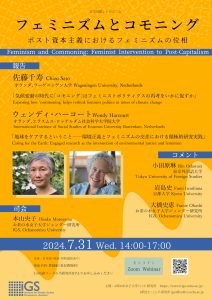2024.7.31 The IGS Symposium “Feminism and Commoning: Feminist Intervention to Post-Capitalism”
The IGS Symposium titled “Feminism and Commoning: Feminist Intervention to Post-Capitalism ” was held on July 31, 2024.
Fumie Ohashi opened the symposium by explaining its purpose: to reassess the post-capitalist concept of “commoning” from a feminist perspective, focusing on the roles of women and minorities, as well as social inclusion and democracy. The symposium explored how commoning could transcend the traditional “rational economic man” model and foster coexistence with non-human entities, while examining how feminism might reconstruct commoning as a response to the new enclosures and depletion of social reproduction caused by global capitalism.
In the first part, Chizu Sato, started a discussion about how commoning in the context of climate change revitalizes feminist politics by challenging patriarchy and capitalism. She analyzed the commons and commoning from a Feminist Political Ecology (FPE) perspective, highlighting the need to deconstruct binary thinking, reevaluate gender roles in economies, and engage with non-human entities. Sato used examples from Mexico and Japan to illustrate how kinship-based communities and interspecies entanglements can help move beyond exploitative socio-ecological relations.
The second speaker in the first part, Wendy Harcourt, examined the relationship between care and commoning through an FPE lens, emphasizing the need to rethink care and knowledge from a feminist perspective and to reconstruct personal and practical life worlds. Drawing on Australian examples, she discussed the importance of learning from indigenous knowledge and reconsidering humanity’s relationship with nature. Harcourt also pointed out the inequalities in resource distribution and the need for equitable and sustainable life worlds, advocating for commoning as a method to counterbalance power imbalances in the development process.
In the second part, three commentators posed significant questions. Fumi Iwashima raised concerns about differentiating commoning communities, using commoning to expose unequal social relations, and the relationship between humans and non-human entities in shared forest usage in Japan. She questioned whether governmental inclusion in commoning communities overlooks reproductive labor burdens on women, particularly elder women in Japan’s rural areas, and asked whether labor in indigenous communities is gendered.
Rin Odawara followed with comments centered around the theme of “imagining more-than-human,” approaching contemporary global issues from a feminist perspective. Odawara discussed how people are often treated as mere machines for the reproduction of labor power for capital, exploited as unpaid or low-paid labor, and viewed as disposable resources in modern society. She explored how the theme of “recovering humanity” appears in the case studies from indigenous communities in Japan and Mexico and how the recovery of the more-than-human can be realized in a world that has undergone extreme capitalization and militarization.
Lastly, Fumie Ohashi, grounded in Marxist feminist discourse, questioned how post-capitalist feminists conceptualize labor within commoning, what solutions feminist commoning offers against structural gender-based violence, and explored the impact of land re-ownership on gender relations in Australian indigenous communities, especially regarding the recovery of rights and care of land.
Time constraints limited comprehensive responses, but Sato and Harcourt responded to as many questions as possible within the available time. Sato noted that the commons are not limited to natural resources; she cited the example of communal washing machines in rural Japanese villages as social commons. She pointed out that changes in social reproduction within such communities can alter gender relations and introduced the need to consider ecological impacts from a more-than-human perspective. Harcourt emphasized the importance of balancing human and non-human rights, using plastic pollution as an example of “negative commons.”
Participants posed additional questions, including how knowledge and skills are shared in commoning, how decommodification can occur within capitalist frameworks, and how religious elements and indigenous cosmologies intersect with commoning from a feminist political ecology standpoint.
In closing, Yoko Totani, Director of the Institute for Gender Studies, highlighted the value of diverse perspectives shared on feminist political ecology and commoning.
Overall, the symposium deepened understanding of the various dimensions of commoning, emphasizing the significance of unpaid domestic labor and social reproduction in sustainable well-being and suggesting that commoning should be viewed not only as resource management but as an important social process involving cultural and political action. The event encouraged a shift beyond anthropocentrism, drawing from the everyday practices of women in indigenous communities to envision new economic and social models beyond capitalism.
LE YU (Ph.D. student at Ochanomizu University)


